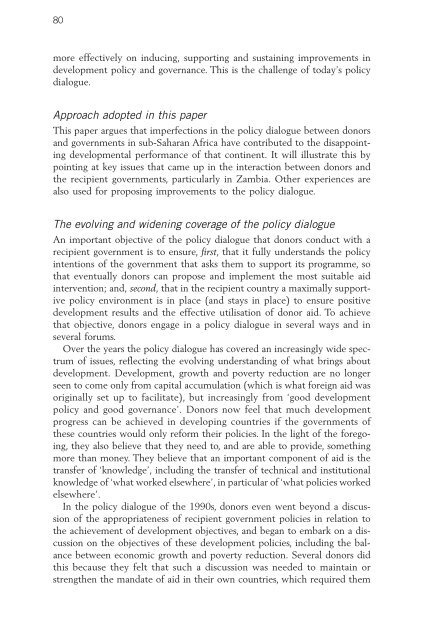Dialogue in Pursuit of Development - Are you looking for one of ...
Dialogue in Pursuit of Development - Are you looking for one of ...
Dialogue in Pursuit of Development - Are you looking for one of ...
Create successful ePaper yourself
Turn your PDF publications into a flip-book with our unique Google optimized e-Paper software.
80<br />
more effectively on <strong>in</strong>duc<strong>in</strong>g, support<strong>in</strong>g and susta<strong>in</strong><strong>in</strong>g improvements <strong>in</strong><br />
development policy and governance. This is the challenge <strong>of</strong> today’s policy<br />
dialogue.<br />
Approach adopted <strong>in</strong> this paper<br />
This paper argues that imperfections <strong>in</strong> the policy dialogue between donors<br />
and governments <strong>in</strong> sub-Saharan Africa have contributed to the disappo<strong>in</strong>t<strong>in</strong>g<br />
developmental per<strong>for</strong>mance <strong>of</strong> that cont<strong>in</strong>ent. It will illustrate this by<br />
po<strong>in</strong>t<strong>in</strong>g at key issues that came up <strong>in</strong> the <strong>in</strong>teraction between donors and<br />
the recipient governments, particularly <strong>in</strong> Zambia. Other experiences are<br />
also used <strong>for</strong> propos<strong>in</strong>g improvements to the policy dialogue.<br />
The evolv<strong>in</strong>g and widen<strong>in</strong>g coverage <strong>of</strong> the policy dialogue<br />
An important objective <strong>of</strong> the policy dialogue that donors conduct with a<br />
recipient government is to ensure, first, that it fully understands the policy<br />
<strong>in</strong>tentions <strong>of</strong> the government that asks them to support its programme, so<br />
that eventually donors can propose and implement the most suitable aid<br />
<strong>in</strong>tervention; and, second, that <strong>in</strong> the recipient country a maximally supportive<br />
policy environment is <strong>in</strong> place (and stays <strong>in</strong> place) to ensure positive<br />
development results and the effective utilisation <strong>of</strong> donor aid. To achieve<br />
that objective, donors engage <strong>in</strong> a policy dialogue <strong>in</strong> several ways and <strong>in</strong><br />
several <strong>for</strong>ums.<br />
Over the years the policy dialogue has covered an <strong>in</strong>creas<strong>in</strong>gly wide spectrum<br />
<strong>of</strong> issues, reflect<strong>in</strong>g the evolv<strong>in</strong>g understand<strong>in</strong>g <strong>of</strong> what br<strong>in</strong>gs about<br />
development. <strong>Development</strong>, growth and poverty reduction are no longer<br />
seen to come only from capital accumulation (which is what <strong>for</strong>eign aid was<br />
orig<strong>in</strong>ally set up to facilitate), but <strong>in</strong>creas<strong>in</strong>gly from ‘good development<br />
policy and good governance’. Donors now feel that much development<br />
progress can be achieved <strong>in</strong> develop<strong>in</strong>g countries if the governments <strong>of</strong><br />
these countries would only re<strong>for</strong>m their policies. In the light <strong>of</strong> the <strong>for</strong>ego<strong>in</strong>g,<br />
they also believe that they need to, and are able to provide, someth<strong>in</strong>g<br />
more than m<strong>one</strong>y. They believe that an important comp<strong>one</strong>nt <strong>of</strong> aid is the<br />
transfer <strong>of</strong> ‘knowledge’, <strong>in</strong>clud<strong>in</strong>g the transfer <strong>of</strong> technical and <strong>in</strong>stitutional<br />
knowledge <strong>of</strong> ‘what worked elsewhere’, <strong>in</strong> particular <strong>of</strong> ‘what policies worked<br />
elsewhere’.<br />
In the policy dialogue <strong>of</strong> the 1990s, donors even went beyond a discussion<br />
<strong>of</strong> the appropriateness <strong>of</strong> recipient government policies <strong>in</strong> relation to<br />
the achievement <strong>of</strong> development objectives, and began to embark on a discussion<br />
on the objectives <strong>of</strong> these development policies, <strong>in</strong>clud<strong>in</strong>g the balance<br />
between economic growth and poverty reduction. Several donors did<br />
this because they felt that such a discussion was needed to ma<strong>in</strong>ta<strong>in</strong> or<br />
strengthen the mandate <strong>of</strong> aid <strong>in</strong> their own countries, which required them

















![CynefinFramework final [Read-Only]](https://img.yumpu.com/19017304/1/190x135/cynefinframework-final-read-only.jpg?quality=85)